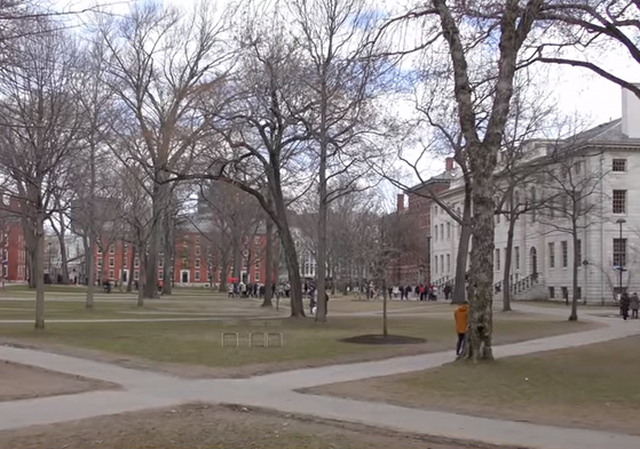Harvard and Other Ivy League Schools Push Congress for Special Tax Cut on Endowments
“Earlier this year, Harvard University President Lawrence Bacow personally met with lawmakers, including Senate Majority Leader Chuck Schumer”

Shouldn’t the exact opposite of this be taking place right now?
The Intercept reports:
Ivy League Universities Push for Special Tax Cut
In the exclusive corridors of Congress, a small army of lobbyists representing the nation’s Ivy League and the wealthiest private universities are calling on lawmakers to cut taxes on multibillion-dollar endowments.
Earlier this year, Harvard University President Lawrence Bacow personally met with lawmakers, including Senate Majority Leader Chuck Schumer, D-N.Y., and members of the Massachusetts delegation, to lobby against the excise tax.
Stanford University, the University of Pennsylvania, and Cornell University have also pushed lawmakers to roll back the 1.4 percent excise tax on private college endowment investment returns passed by Congress in 2017. The excise tax, enacted as part of President Donald Trump’s Tax Cuts and Jobs Act, applies to investment returns on endowment assets of $500,000 per full time equivalent student at private colleges. The formula impacts over 40 private universities around the country.
Last year, thanks to outsized investment returns, large endowments around the country grew in size. Harvard University reported a 33.6 percent return as its endowment swelled to $53.2 billion. In 2021, Stanford University announced a 40.1 percent return, with its endowment growing to $41.9 billion.
Despite the vast holdings and a student base that represents the children of the wealthiest Americans, university endowments, before the passage of this excise tax on investment returns, were otherwise largely tax-free, with donations to endowments shielded from federal and state taxes.
The mass accumulation of wealth by these elite colleges has not prevented the schools from pressing on with a demand for a special tax cut. A review of lobbying records show that private colleges have mobilized over two dozen lobbyists to pressure policymakers on repealing the tax. Harvard University, for example, has a team of staff lobbyists, along with two additional lobbyists on retainer from the law firm O’Neill, Athy & Casey, to work on the issue.
“Repealing the endowment tax would be an indirect gift to the private equity and hedge fund billionaires that already exploit too many tax breaks,” said Charlie Eaton, a sociology professor at the University of California, Merced.
 DONATE
DONATE
Donations tax deductible
to the full extent allowed by law.








Comments
Not just no, but HELL, NO.
How about a trade? A tax cut in trade for tuition being slashed by 2/3?
I’m not sure what the rationale is for the tax exemption on profits made by the educational organization on outside activities unrelated to their educational mission (like investments).
Donations should be tax exempt, the same with tuition payments by or on behalf of students. That is education-related “income”. But income from investments is totally unrelated to the educational activity or an educational mission. Why should it be any more tax exempt than profits by others on investment earnings?
In general for non-profits, unrelated business income is subject to a tax and the organization must file a Form 990T. For example, medical societies are non-profit, but if they publish a professional journal, and that journal sells advertising, the advertising revenue is subject to UBTI.
In the case of colleges, there are many enterprises that are unrelated business income, but the savings and investments are not covered by that tax. The theory is that if the Catholic church buys a pasta company, it is unfair for the pasta company to compete against other pasta companies without paying taxes. When a non-profit invests money, whether it is a CD or in stocks, there is not unfair competition against others.
In 2017, Congress was concerned that some colleges were accumulating wealth without paying it out to benefit society and the students. So, a special 1.4% excise tax applies to schools who have a per capital endowment of more than $500,000. For example, Cornell’s endowment per student is only about $280,000, the lowest in the Ivy League. The purpose was to encourage schools to apply the wealth they generate to lower tuition or to give out scholarships, not to prevent unfair competition between non-profit activities.